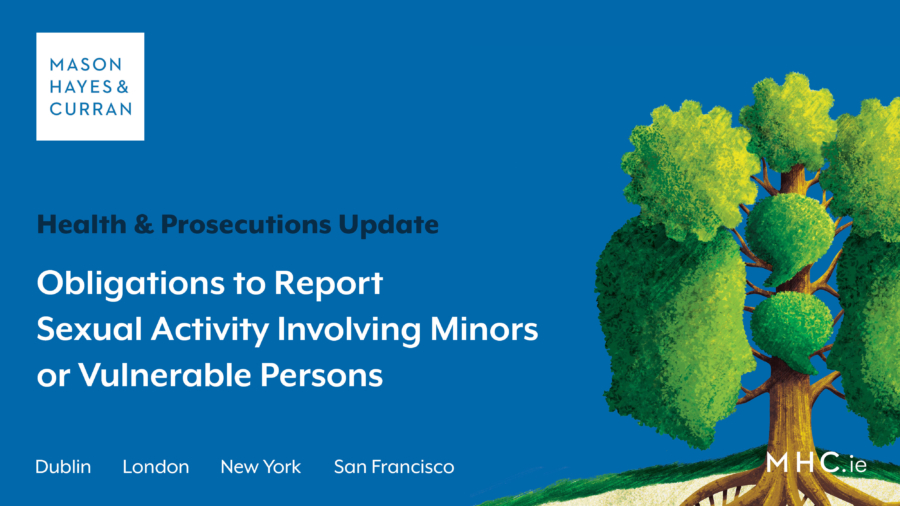Obligations to Report Sexual Activity Involving Minors or Vulnerable Persons

Consent to sexual activity is complex for children and vulnerable persons. Legislation in recent years has increased responsibility on the wider community to report concerns arising in respect of sexual activity or abuse.
We examine the law on consent to sexual activity and highlight when mandatory reporting is required.
Children
There are separate but relevant criminal and child protection laws to consider regarding sexual activity of children. In many circumstances, criminal investigations will run parallel to TUSLA (Child and Family Agency) child protection assessments.
Criminal Law
The Criminal Law (Sexual Offences) Act 2006 outlines the legal age of consent to sexual activity as 17 years. Within these provisions, there are specific offences depending on the age of a child. There are some defences to these offences, but consent of a minor is not a defence as a child is not deemed to have the capacity to consent if they are under 17 years. The Criminal Justice Act (Children and Vulnerable persons) Act 2012 also places onerous obligations on all persons to report crimes against children including sexual activity of minors with other minors or adults.
Child Protection Law
The Children First Act 2015 provides a list of sexual offences, which come under the category of sexual abuse of a child, which includes sexual activity with any person aged under 17 years. If you are a mandated person, you may have a legal requirement to report this to TUSLA. However, there are some differences in terms of how sexual activity of children meets the criteria for sexual abuse. For example, a sexual relationship where one or both children are under 17 years of age is illegal but it might not be regarded as child sexual abuse, depending on the ages of the children involved.
What age are the persons involved?
If a child aged under 15 years is engaging in sexual activity, this must always be reported to TUSLA e.g. a child aged 14 who presents to a GP seeking access to contraception even where there is parental consent. If the sexual activity involves two children aged between 15 and 17, you will need to consider the exemptions in requirements to report this as sexual abuse. Generally, this will not be reportable unless there are concerns around level of maturity, capacity to consent, intimidation or exploitation. If you do not report, it would be important to record your consideration of these factors.
Should I report to TUSLA, Gardaí or both?
The Criminal Justice Act (Children and Vulnerable persons) Act 2012 places onerous obligations on all persons to report crimes against children and vulnerable persons, including sexual abuse or activity with a child under 17 years. This is in addition to your obligations under the Children First Act. It is important to note that in some case, depending on the nature of the sexual activity and age of the child, you may be legally required to make separate and distinct reports to TUSLA and Gardaí.
Vulnerable persons
The issues of consent, capacity and legal requirements should be considered separately in the case of vulnerable adults. In some cases, an adult may be perceived as vulnerable without falling under the formal general definition set out below but does have the capacity to consent to sexual activity. Cases involving vulnerable adults should be considered on a case by case basis. Ireland is a signatory to the UN Convention on the Rights of Persons with Disabilities, which provides that that all persons with all types of disabilities must enjoy all human rights and fundamental freedoms. In addition, it provides that people with disabilities should be viewed as people who are capable of making decisions for their lives based on their free and informed consent, including sexual activity.
What is vulnerable person?
Both the Criminal Justice (Withholding of Information on Offences against Children and Vulnerable Persons) Act 2012 and the Criminal Law (Sexual Offences) Act 2017 provide definitions for a vulnerable person. The general definition is a person who is suffering from a mental disability, intellectual disability or mental illness which is of such a nature, degree or severity to restrict their ability to guard themselves against serious exploitation or abuse (physical or sexual or both) by another person. If there are concerns relating to the capacity of a vulnerable person, they can be formally assessed by an experienced independent medical practitioner.
Is the person in a residential unit? If so, is the person with whom they are having a relationship a staff member?
If the person with whom a vulnerable person is having a relationship is a staff member and they are part of a contract of service or a contract for services who is responsible for the education, supervision, training, treatment, care or welfare of the vulnerable person, they are defined as a “Person in Authority” under the Criminal Law (Sexual Offences) Act 2017. The Act provides that a person in authority who engages in a sexual act with a vulnerable person shall be guilty of an offence. In addition, a person in authority who invites, induces, counsels or incites a vulnerable person to engage in a sexual act shall be guilty of an offence. It shall not be a defence for the defendant to prove that the person against whom the offence is alleged to have been committed consented to the sexual act.
Who do I report my concerns about a vulnerable person to?
- It can be discussed with a healthcare professional or referred to the HSE Adult Safeguarding Team in the relevant CHO area within the HSE
- If it is believed that there is an immediate risk of harm to the person or it is believed that a criminal offence has occurred, contact the Gardaí, and
- If the person is in a residential or medical setting, practitioners should follow internal policies as well as being aware of their legal obligation to report to Gardaí under the Criminal Justice (Withholding of Information on Offences against Children and Vulnerable Persons) Act 2012.
Consideration should also be given to utilising specialist support services (ie advocate) for the vulnerable person.
Is there a National Policy in respect of safeguarding?
The Safeguarding Vulnerable Persons at Risk of Abuse - National Policy and Procedures applies to all HSE and HSE funded services. The Government is progressing Adult Safeguarding legislation. Once this legislation becomes law, it is expected to make further and better provision for the care and protection of adults who are at risk; to establish the National Adult Safeguarding Authority; and to require certain persons to make reports to the National Adult Safeguarding Authority in respect of adults at risk of abuse or harm in certain circumstances.
Conclusion
If you are aware or believe there has been an offence of a sexual nature against a child or vulnerable person, this should be reported to the Gardaí. It will be up to the Gardaí to determine if the case meets the criteria for prosecution. The Children First Act 2015 is clear that your obligations to report to the Gardaí are in addition to your requirements to make a mandated report so often two separate reports to TUSLA and Gardaí are required, ideally at the earliest opportunity.
For more information on the scope of the law on consent and the mandatory report obligations, contact a member of our Health & Prosecutions team.
The content of this article is provided for information purposes only and does not constitute legal or other advice.
Share this:



